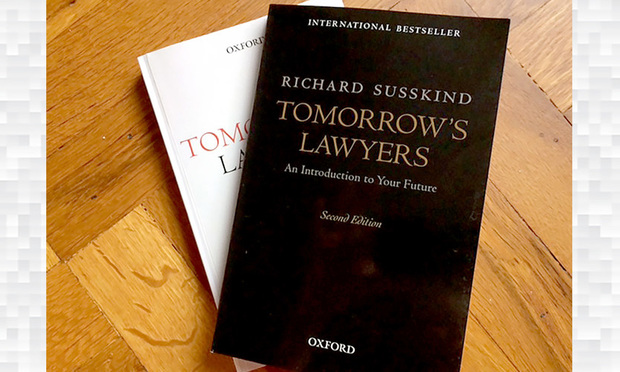Susskind on The Future for Law Firms and Leverage
Legal futurist Richard Susskind opines on the future for law firms in the latest installment of our serialization of his book Tomorrow's Lawyers.
October 24, 2017 at 01:06 PM
5 minute read

This is the third installment of a serialization of excerpts from the second edition of legal futurist Richard Susskind's book Tomorrow's Lawyers: An Introduction to Your Future. Read Roy Strom's related piece here on how law firms are dealing with declining leverage.
From Susskind's book:
The Future for Law Firms
One central question emerges from the first part of this book: to what extent can lawyers' work be undertaken differently—more quickly, cheaply, and efficiently, but to a higher quality—using alternative methods of working? This is a key question of the day. As noted in Chapter 2, lawyers have for many years performed routine work for which they have been overqualified and for which, in turn, they have been overcharging. In boom times, in what was a sellers' market, there was little need for successful law firms to be detained by the challenge of delivering services in new and more efficient ways. Today, however, as cost pressures from clients continue to intensify, as new service providers emerge, and as new technologies are deployed, it is unwise for any firm to avoid thinking about how it should work differently.
Nonetheless, I find that many traditional practices are not changing much. They are not yet adopting alternative methods of working. This is partly an issue of change management, in that law firms tend to be so busy serving clients and meeting their own financial targets that they allow little time for internal reform—it is not easy to change a wheel on a moving car. It is also, in part, a structural matter, because most law firms still aspire to the old textbook, broad-based pyramidic structure mentioned in Chapter 2, whereas alternative methods of sourcing call for a revision, if not rejection, of that model. And, if we are honest, there is also still reluctance amongst mainstream partners in many firms to believe that they really need to change. There is an inclination, in other words, to cling on to the old ways of working in the hope that there will soon be a solid economic recovery (from the downturn, Brexit, or whatever) and normal business can be resumed.
Prospects for Law Firms
However, if the analysis and predictions of Part One of this book are sound, then law firms in the coming decade and beyond will be driven relentlessly by their clients to reduce their costs. This is the heart of the more-for-less challenge (see Chapter 1). For most firms, despite their current hesitancy, I predict that this will lead eventually to the deployment and execution of alternative sourcing strategies (Chapter 4). And, in turn, we will witness the end of leverage—at best the pyramid (with partners at the top and less experienced lawyers at the base) will move from being broad-based to narrow-based. No longer will firms aspire to building large teams of junior lawyers as the basis of their profitability. 'To survive', in the memorable words of Theodore Levitt (in his seminal article, 'Marketing Myopia'), lawyers 'will have to plot the obsolescence of what now produces their livelihood'.
In due course, some firms may, for example, choose to strip away their junior and trainee lawyers, or stop recruiting them. They might then operate with a team of high-powered partners, each supported by, say, one associate; and the routine work will be resourced beyond the firm. Others may elect to build their own alternative sourcing capacities, such as internal teams of paralegals, or maybe through the establishment of their own off-shored legal facility. Still others will find opportunities for novel legal services (see Chapter 13), by creating markets that formerly did not exist or by inserting themselves in different places in legal supply chains (for example, by becoming involved far earlier in the life cycles of their clients' business dealings).
Although these changes will impact on all firms (large and small), some larger firms will want to argue that, for 'high-end work', notions such as commoditization, decomposing, and multi-sourcing are of little relevance. But, on examination, it transpires that this concept of 'high-end work' is something of a myth—even in the world's largest deals and disputes there are substantial components of work that can be routinized and sourced differently. And large firms that insist they only undertake bespoke work, which is a very different claim from asserting that they only do high-end work (bespoke being a subset, often small, of high-end), may find themselves at risk. They may be relegated, for instance, to the role of subcontractor to other organizations that step forward to undertake the project management of sizeable deals and disputes. At the same time, alternative providers may take up the work that these firms previously assigned to their junior lawyers.
This content has been archived. It is available through our partners, LexisNexis® and Bloomberg Law.
To view this content, please continue to their sites.
Not a Lexis Subscriber?
Subscribe Now
Not a Bloomberg Law Subscriber?
Subscribe Now
NOT FOR REPRINT
© 2025 ALM Global, LLC, All Rights Reserved. Request academic re-use from www.copyright.com. All other uses, submit a request to [email protected]. For more information visit Asset & Logo Licensing.
You Might Like
View All

Profits Surge Across Big Law Tiers, but Am Law 50 Segmentation Accelerates
4 minute read
Is It Time for Large UK Law Firms to Begin Taking Private Equity Investment?
7 minute read
Adding 'Credibility' to the Pitch: The Cross-Selling Work After Mergers, Office Openings
5 minute readTrending Stories
- 1People in the News—Jan. 30, 2025—Rubin Glickman, Goldberg Segalla
- 2Georgia Republicans Push to Limit Lawsuits. But Would That Keep Insurance Rates From Rising?
- 3Trending Issues in Florida Construction Law That Attorneys Need to Be Aware Of
- 4The Importance of Judicial Elections
- 5Ephemeral Messaging Going Into 2025:The Messages May Vanish But Not The Preservation Obligations
Who Got The Work
J. Brugh Lower of Gibbons has entered an appearance for industrial equipment supplier Devco Corporation in a pending trademark infringement lawsuit. The suit, accusing the defendant of selling knock-off Graco products, was filed Dec. 18 in New Jersey District Court by Rivkin Radler on behalf of Graco Inc. and Graco Minnesota. The case, assigned to U.S. District Judge Zahid N. Quraishi, is 3:24-cv-11294, Graco Inc. et al v. Devco Corporation.
Who Got The Work
Rebecca Maller-Stein and Kent A. Yalowitz of Arnold & Porter Kaye Scholer have entered their appearances for Hanaco Venture Capital and its executives, Lior Prosor and David Frankel, in a pending securities lawsuit. The action, filed on Dec. 24 in New York Southern District Court by Zell, Aron & Co. on behalf of Goldeneye Advisors, accuses the defendants of negligently and fraudulently managing the plaintiff's $1 million investment. The case, assigned to U.S. District Judge Vernon S. Broderick, is 1:24-cv-09918, Goldeneye Advisors, LLC v. Hanaco Venture Capital, Ltd. et al.
Who Got The Work
Attorneys from A&O Shearman has stepped in as defense counsel for Toronto-Dominion Bank and other defendants in a pending securities class action. The suit, filed Dec. 11 in New York Southern District Court by Bleichmar Fonti & Auld, accuses the defendants of concealing the bank's 'pervasive' deficiencies in regards to its compliance with the Bank Secrecy Act and the quality of its anti-money laundering controls. The case, assigned to U.S. District Judge Arun Subramanian, is 1:24-cv-09445, Gonzalez v. The Toronto-Dominion Bank et al.
Who Got The Work
Crown Castle International, a Pennsylvania company providing shared communications infrastructure, has turned to Luke D. Wolf of Gordon Rees Scully Mansukhani to fend off a pending breach-of-contract lawsuit. The court action, filed Nov. 25 in Michigan Eastern District Court by Hooper Hathaway PC on behalf of The Town Residences LLC, accuses Crown Castle of failing to transfer approximately $30,000 in utility payments from T-Mobile in breach of a roof-top lease and assignment agreement. The case, assigned to U.S. District Judge Susan K. Declercq, is 2:24-cv-13131, The Town Residences LLC v. T-Mobile US, Inc. et al.
Who Got The Work
Wilfred P. Coronato and Daniel M. Schwartz of McCarter & English have stepped in as defense counsel to Electrolux Home Products Inc. in a pending product liability lawsuit. The court action, filed Nov. 26 in New York Eastern District Court by Poulos Lopiccolo PC and Nagel Rice LLP on behalf of David Stern, alleges that the defendant's refrigerators’ drawers and shelving repeatedly break and fall apart within months after purchase. The case, assigned to U.S. District Judge Joan M. Azrack, is 2:24-cv-08204, Stern v. Electrolux Home Products, Inc.
Featured Firms
Law Offices of Gary Martin Hays & Associates, P.C.
(470) 294-1674
Law Offices of Mark E. Salomone
(857) 444-6468
Smith & Hassler
(713) 739-1250










